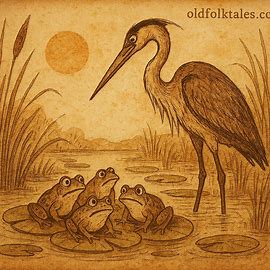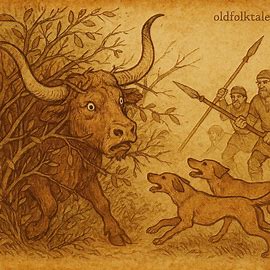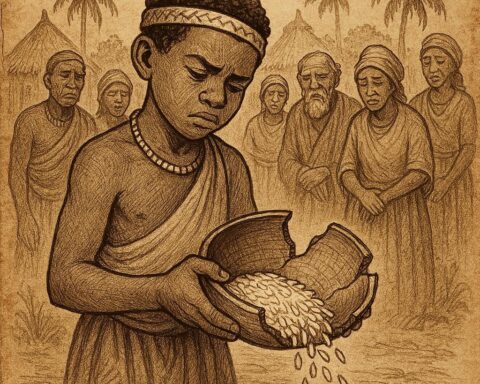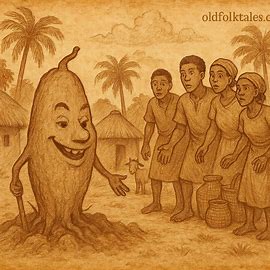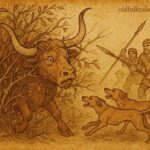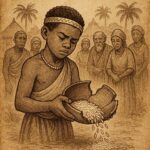Long ago, in the heart of Madagascar, the frogs of a wide, rippling pond lived together in peace. The waters were cool, ringed with reeds, lilies, and tall grasses that whispered when the wind passed. In that pond, no creature ruled over them. They croaked when they wished, leapt where they pleased, and shared the water freely. Life was simple, and their freedom was complete.
Yet in time, this freedom began to feel empty. One day, as they gathered in chorus upon the lilypads, the frogs grumbled that they had no chief. “How can we thrive without a leader?” one croaked. “Without guidance, our lives are scattered and small.” The others nodded in agreement. They believed that if they had a ruler, order and prosperity would come, and their families would live better than before.
So the frogs lifted their voices to the blazing sun. “O Sun, bright father of the sky, grant us a chief! Give us one who will guide us, for our hearts are weary without a leader.”
The sun, golden and unblinking, looked down upon the pond. The day was scorchingly hot, and the frogs’ cries made him laugh. “A chief, is it?” he said. “Very well. Let me grant you one.” Breaking off a piece of dry wood, the sun hurled it down into the pond.
The wood struck the surface with a thunderous splash. Water surged high, and the frogs scattered in terror. They dove deep into the muddy bottom, trembling, certain that doom had fallen upon them.
Hours passed. Slowly, ripples smoothed, and the pond grew still. Peering upward, the frogs saw the piece of wood floating gently, unmoving, silent as a sleeping log. Curious, a few dared to rise. They swam near and found that it neither moved nor threatened. Soon the boldest of them leapt onto it, discovering it was harmless. One by one, the frogs hopped aboard, croaking with laughter.
READ THIS: The Big Eel and the Little Eel: A Madagascan Folktale That Teaches Lessons on Obedience and Wisdom
“This is our chief?” they scoffed. “This lifeless stick? It makes no commands, gives no protection, inspires no fear. What kind of leader is this?”
Disappointed, the frogs once more raised their voices. “O Sun, this will not do! We do not want a chief who lies still as a stone. Send us another!”
The sun grew stern at their ingratitude, but he granted their request. This time, he sent them a heron. From the skies it swooped, its long beak gleaming like a spear, its wings casting shadows across the pond. No sooner had it landed than the heron bent low and snatched up a frog. With a gulp, it swallowed him whole.
Panic erupted. The frogs leapt in every direction, their once-happy pond now a place of dread. The heron stalked gracefully through the reeds, devouring as many frogs as its belly could hold. Their croaks of joy turned into cries of terror.
In secret, the frogs turned to the gentle moon. “O Lady of the Night, pity us! Plead with the Sun to remove this heron, cruel as death, and return to us the piece of wood. Better a silent log than this devouring tyrant.”
The moon, pale and soft, carried their plea. The Sun listened and replied: “I gave you two chiefs: one gentle, the other cruel. You should have been content with the first, yet you scorned him because he brought no excitement. Now that the heron rules you, you regret the log. Remember this: He who demands too much sweetness, when he tastes bitterness, will not endure it.”
And so the frogs learned, too late, the price of discontent.
Moral Lesson
This Madagascan folktale teaches that discontent often blinds us to what we already have. The frogs, free and safe, longed for a ruler. When given a harmless chief, they despised him for his stillness. When given a cruel one, they realized too late that silence had been mercy.
True leadership is not always dramatic, nor is guidance always loud. Sometimes peace itself is the greatest gift. Those who crave change for its own sake may find themselves bound by the very authority they once sought.
Knowledge Check
Why did the frogs first want a chief?
They believed a leader would bring order and prosperity.
What did the sun send first as their chief?
A piece of wood that floated harmlessly in the pond.
Why were the frogs dissatisfied with the piece of wood?
Because it was motionless and did not command or stir them.
What happened when the sun sent a heron instead?
The heron devoured the frogs, turning their pond into a place of terror.
What lesson did the sun teach the frogs at the end?
That they should have been content with the first chief; discontent led them to ruin.
What is the cultural origin of this folktale?
It is an Antambahoaka folktale from Madagascar.
Source: Antambahoaka folktale, Madagascar.
